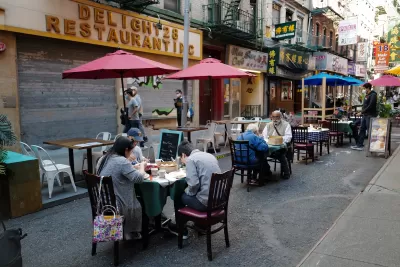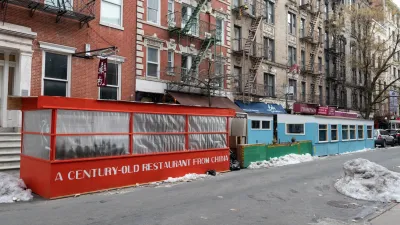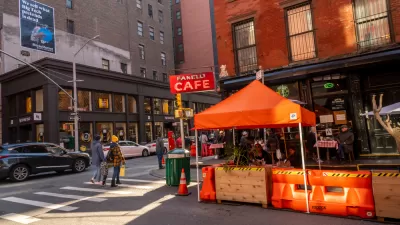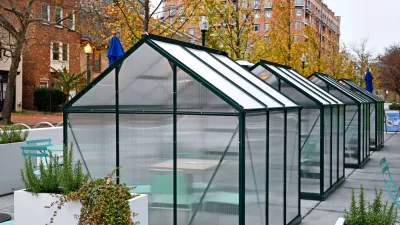Restaurant owners say the city’s new outdoor dining program makes it too difficult and expensive to operate al fresco setups.

Many of New York City’s outdoor dining structures are being removed to make way for (mostly free) parking after restaurants and bars failed to make them compliant with the city’s new requirements.
According to a report by Kevin Duggan in Streetsblog NYC, businesses with non-compliant designs had to take down their setups by November 1, while compliant businesses must remove them by November 29, since the outdoor dining program doesn’t apply in winter months. The new rules, which call for a public hearing for new outdoor dining applications, require that structures be easily removable and lightweight, banning fully enclosed hard structures.
Restaurant owners say the seasonal program makes operating an outdoor dining area more expensive since they must pay for removal and storage during the off-season, and many say they will stop offering outdoor dining altogether. “The numbers of sheds dropped significantly after the new regime first kicked in over the summer, with around 3,000 applications for roadway and sidewalk cafés as of late September, according to the Department of Transportation. Transportation officials estimate that the program peaked at 6,000 to 8,000 participants, including some 5,000 setups as of this summer.”
FULL STORY: Parking? Lots! Outdoor Dining Structures Are Coming Down Across the City

Trump Administration Could Effectively End Housing Voucher Program
Federal officials are eyeing major cuts to the Section 8 program that helps millions of low-income households pay rent.

Planetizen Federal Action Tracker
A weekly monitor of how Trump’s orders and actions are impacting planners and planning in America.

Ken Jennings Launches Transit Web Series
The Jeopardy champ wants you to ride public transit.

Rebuilding Smarter: How LA County Is Guiding Fire-Ravaged Communities Toward Resilience
Los Angeles County is leading a coordinated effort to help fire-impacted communities rebuild with resilience by providing recovery resources, promoting fire-wise design, and aligning reconstruction with broader sustainability and climate goals.

When Borders Blur: Regional Collaboration in Action
As regional challenges outgrow city boundaries, “When Borders Blur” explores how cross-jurisdictional collaboration can drive smarter, more resilient urban planning, sharing real-world lessons from thriving partnerships across North America.

Philadelphia Is Expanding its Network of Roundabouts
Roundabouts are widely shown to decrease traffic speed, reduce congestion, and improve efficiency.
Urban Design for Planners 1: Software Tools
This six-course series explores essential urban design concepts using open source software and equips planners with the tools they need to participate fully in the urban design process.
Planning for Universal Design
Learn the tools for implementing Universal Design in planning regulations.
Ada County Highway District
Clanton & Associates, Inc.
Jessamine County Fiscal Court
Institute for Housing and Urban Development Studies (IHS)
City of Grandview
Harvard GSD Executive Education
Toledo-Lucas County Plan Commissions
Salt Lake City
NYU Wagner Graduate School of Public Service





























